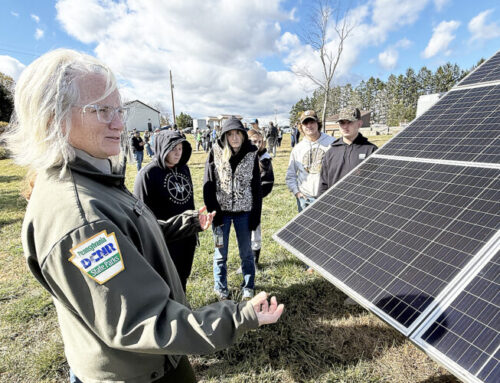Minnesota cannabis dispensaries struggle to stock shelves as supply chain lags behind
October 20, 2025
Several adult-use cannabis businesses have the greenlight from the state to operate but don’t have the supply to stock their store shelves as Minnesota’s budding industry gets off the ground.
Minnesota legalized marijuana for recreational use over two years ago and the licensing process continues. So far, nearly 60 businesses have received that stamp of approval with 1,400 others pending final clearance from regulators, according to state data.
A majority of those licensed today are microbusinesses with a retail “endorsement” clearing the way for sales.
Mark Eide, who owns In-Dispensary in downtown Minneapolis, is one of them. While he was issued the license in August, his store isn’t selling adult-use cannabis products, only the lower-dose hemp-derived THC edibles that have been on the market for years. He told WCCO that’s led to a notable decline in business and contributed to layoffs.
“I know for a fact just based on the sheer volume of foot traffic and phone calls that we would be doing four times the amount of business. We should be actually handling about 80 customers per day. Instead, we’re handling two to four,” Eide told WCCO in an interview on Monday. “We could hire back the two people that we had. We could expand our hours. We could hire more people. Instead, we simply can’t get product.”
Right now, there are two cultivators licensed, with plants that are growing but are not yet mature, to sell cannabis flower to dispensaries like Eide’s
Minnesota also has tribal compacts with three tribes — which could grow and sell earlier without a state license because they are sovereign nations — but there are tribal dispensaries on and off reservations that need supply, too. There isn’t enough growing to also support everyone else.
Joelle D’Alencar, owner of Loon Leaf in Blaine, is in a similar situation as Eide and shares the same frustrations.
“People are incredibly frustrated. Businesses are honestly going to close before they even get a chance to get started because it’s an incredibly expensive industry to get into,” D’Alencar said.
Eric Taubel, director of the Office of Cannabis Management, in an interview said he anticipated this part of the market rollout would be the hardest. But he remained confident that as additional tribal compacts are executed and other businesses begin cultivation, the supply chain will improve.
In addition to the two licensed cultivator businesses, 24 others have preliminary approval, which means they are finalizing the necessary paperwork to get the official OK. He also noted that 13 of the 52 microbusinesses licensed have a cultivation endorsement and medical cannabis companies can wholesale if they choose to, which could also boost product supply.
Taubel estimated that Minnesota needs 1.5 million square feet of cannabis canopy to meet the demand in Minnesota. The state has a fraction of that so far.
“There is a lack of product available right now, but that’s the reality when you start kind of from nothing and have to build every piece of infrastructure from scratch,” he told WCCO in an interview.
Eide and D’Alencar said other issues are beleaguering the market launch as well: there aren’t any transporter licenses, which are authorized to bring product from business to business, approved and just two testing facilities so far.
“It’s not just, ‘Okay, we have product.’ But it’s, ‘How are we going to get the product? Who’s going to test the product? Is it going to come in bulk, or is it going to come pre-packaged?’ There’s a lot of other issues that kind of need to be resolved in order to get that steady flow of supply,” D’Alencar said.
Taubel said regulators are close to giving final approval to one transporter and noted that both the tribes and medical companies can transport their own products if they decided to wholesale.
“We’ve been hopeful and we’ve seen early returns that some of the compacts that the governor has signed into with tribal nations is providing some access to early supply,” he said.
RISE, one of the medical companies operating in Minnesota, said it would want to expand sale of its product elsewhere in Minnesota but said they are confined by state rules on how much they can grow and manufacture. Right now, the company is selling adult-use cannabis in its dispensaries in addition to patients in the medical program.
“We are currently bound by the state’s cultivation and manufacturing restraints, which limit the amount of adult-use inventory available to sell,” a spokesperson said in an email. “We are already selling medical product to other dispensaries and would love to sell adult-use product to others if we are able to successfully resolve the supply/demand imbalance with the state.”
Eide said that many customers are confused by In-Dispensary’s offerings, unaware of the supply chain delays. They come to his store expecting to buy adult-use cannabis and leave disappointed. He understands their frustration.
“You have to have a very long explanation process with them to educate them on what’s going on and why we don’t have it,” Eide said.
On Monday, Minnesota signed its third tribal compact with Prairie Island Indian Community. It has other compacts with White Earth Nation and the Mille Lacs Band of Ojibwe. The agreements allow them to open off-reservation dispensaries and sell product to non-tribal businesses. White Earth Nation is working with Legacy Cannabis in Duluth to stock its shelves.
Featured Local Savings
Search
RECENT PRESS RELEASES
Related Post



